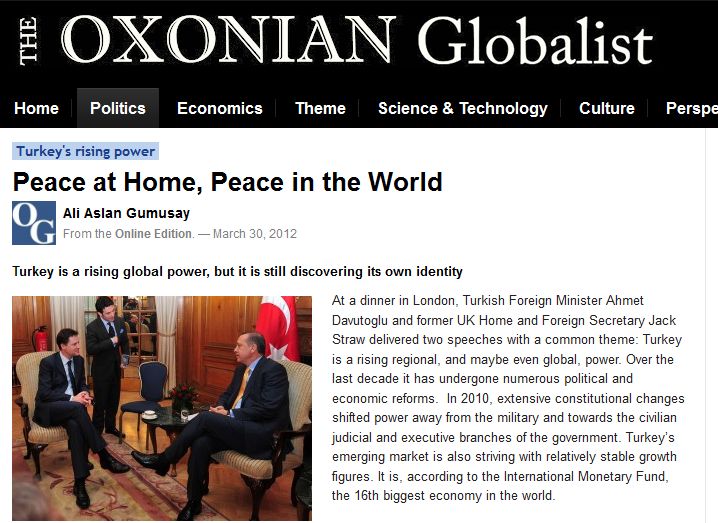Turkey is a rising global power, but it is still discovering its own identity. Article in the Oxonian Globalist.
Turkey in the world – between continuity & change
 Just returned from a talk by the current Turkish Ambassador to the UK. The event was under Chatham House Rules, hence I will not be able to report from it. But I will use this and previous events in the last couple of weeks as an anchor for some reflections on Turkish Foreign Policy.
Just returned from a talk by the current Turkish Ambassador to the UK. The event was under Chatham House Rules, hence I will not be able to report from it. But I will use this and previous events in the last couple of weeks as an anchor for some reflections on Turkish Foreign Policy.
// A rising power…
Last week Davutoglu, Babacan, Boris Johnson and Jack Straw gave some interesting speeches at a dinner in London. The overall tone was clear: Turkey is a rising regional if not global power. It is the 16th biggest economy in the world with phenomenal stable growth figures currently approximately at around 8% per annum. Erdogan is a leader empowered with all three Weberian forms of authority, namely traditional, rational-legal and charismatic. And Davutoglu is a professor who can and successfully puts into practice his academic foreign policy theory.
// …in the making
Now, not everything is rosy. Turkey still faces various internal struggles and has not zero problems with all its neighbours. It needs the growth to employ its phenomenally young labour force. And it is still in a process of finding its own identity with regard to its own history internally and vis-à-vis its neighbours externally.
// …in the middle
Yet, with a political and economic crisis in Europe, an uprising in the MENA region and a strengthening of the East, Turkey has a unique role. It is not only geographically but also in many ways culturally at the crossroads, right in the middle – and that so from the very beginning, whether that is through its Hellenistic, Roman-Byzantine, Seljukian or Ottoman heritage, to name a few. In a time where extremes merge, one might want to look to Turkey to perceive an experiment of a global melting pot – not through migration, but through its position in time and place.
// Whither to go
At the event last week, Jack Straw said that Turkey is now recognized as equal, which ipso facto implies it was not before. Europe’s policies are or at least should take this into considerations. Turkey may end up at the wrong side of the balance sheet and become a liability to an increasingly introverted Europe, rather than an asset. Meanwhile Turkey’s diaspora builds various cultural, social and economic institutions around the world. Turkey’s new ministry reaches out to them at events like the one just a couple of weeks ago in Berlin celebrating 50 years since the beginning of the guestworker agreement. And next weekend a global entrepreneurship summit takes place in Istanbul, as a follow-up to the one intitiated by Obama.
Turkey’s role is changing. And this is not only due to its current politico-economic strength but rather a simple stock market like calculation. A company thereby is valued as the sum of its discounted future cash flow. A rising Turkey will become more influential in the future and by that very fact becomes increasingly influential in the present. And this is enacted in practice. Fascinating.
This post was also published by “Politics in Spires” here.
